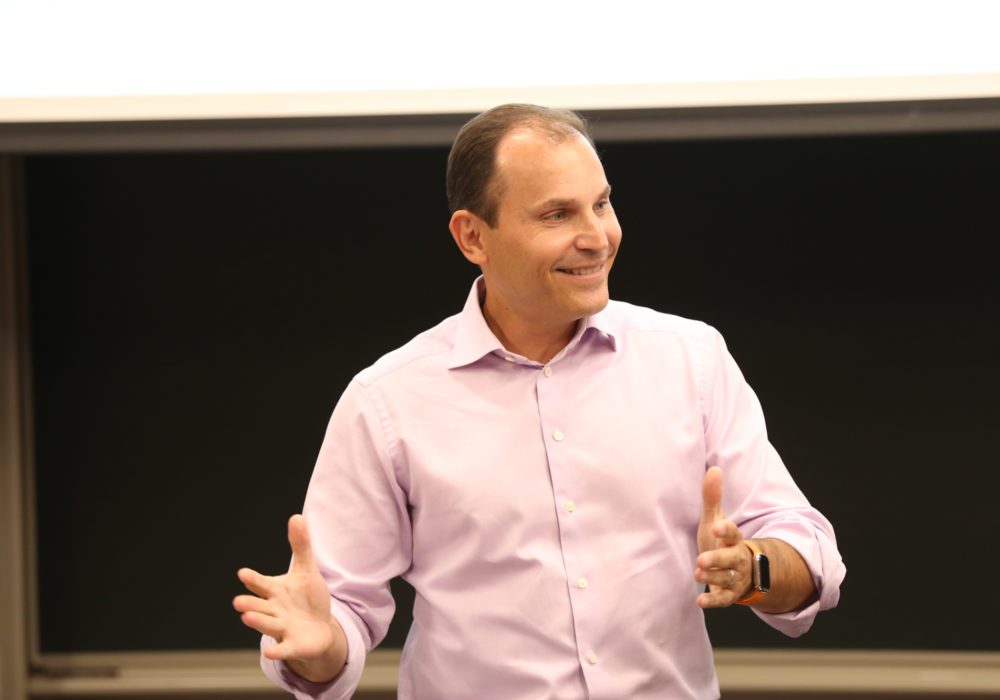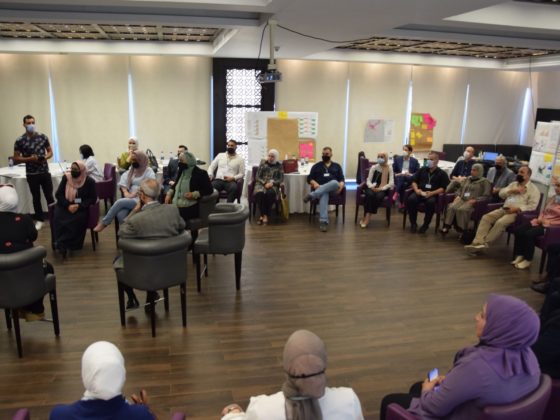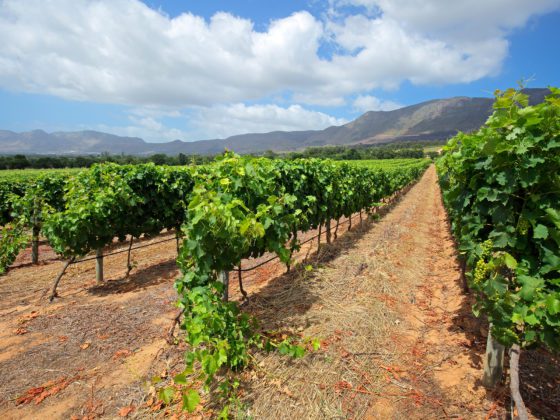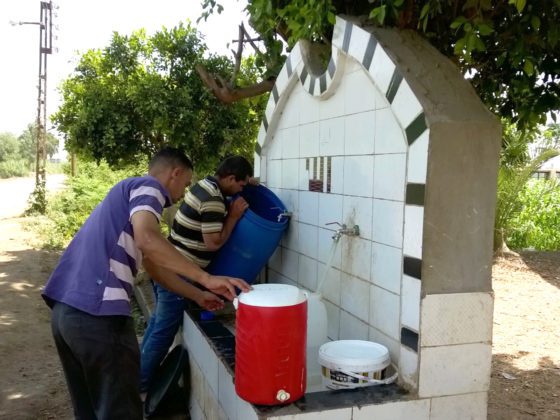Fernando Mercé is a Darden alumn (MBA 1998) and the CEO of Nestlé Water North America, a 4.5 billion dollar company. He visited Darden on October 1st. He spoke to the MBA students about Nesté’s water strategy going forward, and the challenges of the bottled industry at large. We asked him a few questions afterwards.
Do you see bottled water as a substitute for tapped water?
No. Bottled water cannot, and will not, replace tap water – and we never expect it to. However, we feel that bottled water is an important alternative to sugar-sweetened beverages, especially at a time when more and more beverages are consumed away from home.
The importance of healthy hydration is something I believe in very deeply. Before I came to work at Nestlé Waters, my family and I had our own health journey related to sugar. We used to drink soda in my home until several years ago when my son began exhibiting some adverse effects to the added-sugar intake. We decided to cut out sugar-sweetened beverages altogether, and we haven’t looked back. This mission to encourage people to choose water, in any form – whether tap, bottled or filtered – is a big reason why I ultimately decided to join the company.
My family’s experience aside, our country is facing a major health crisis with obesity and all of its associated health risks. When you consider that substituting water for one 20-ounce sugar-sweetened beverage each day will save you about 87,000 calories per year, it’s amazing to consider the enormous impact someone can have on their health just by making this one simple change in their lives.
Bottled water is also essential in times of natural disaster or other emergencies where access to safe, clean drinking water is unavailable. I am especially proud of the work our local team in Michigan has done to support the community of Flint since the beginning of the water crisis in 2015. Starting in early May 2018, we began donating regular truckloads of bottled water to the three East Michigan Food Bank Help Centers. From May 2018 through the end of August 2019 alone, we have donated more than 6.5 million bottles of water, and we continue to make weekly deliveries.
What are the challenges that the water bottling industry faces in the future? What is Nestlé doing about it?
There are really two major areas where the industry is facing some challenges:
Packaging
Our world is facing a major plastic waste crisis. However, the knee-jerk reaction many people have for addressing the issue, namely bans on certain products, is often misguided and doesn’t address the heart of the matter. For instance, PET plastic, which is what we use to make most of our products, is a highly durable material that was never designed to be thrown away. It was designed to be recycled and reused again and again. For our part at Nestlé Waters, we carefully design our packaging – down to the caps and the labels – to be 100% recyclable, and we are helping to create a market for recycled materials by using recycled plastic (rPET) in our own packaging. We will convert our Poland Spring brand to 100% recycled plastic across its still water portfolio by 2022 – the first major bottled water brand to do so – and we have committed to achieve 50% recycled plastic across our entire Nestlé Waters U.S. domestic still water portfolio by 2025. At the same time, we are also experimenting with other innovative solutions, such as biodegradable and bio-based materials for our packaging, as well as “beyond the bottle” solutions, such as our “Refill Plus” customizable water dispenser system.
Misconceptions about Water
Water is an emotional issue for many people, and misinformation is everywhere, which can make it difficult to break through. For instance, many people forget that the water we use in our production is a renewable resource, if it is managed responsibly – which we do. From a basic business perspective, it would make absolutely no sense to invest millions of dollars into our local operations just to deplete the natural resources on which our business relies.
Our team of Natural Resource Managers, who are highly-trained hydrologists, geologist and engineers, have a deep understanding of the complexities of the water system and natural environment, and are passionate about sharing that knowledge with the communities where we operate. That’s why we are working toward certifying all of our sites according to the globally recognized Alliance for Water Stewardship (AWS) Standard by 2025. The AWS Standard, which was founded and supported by industry leaders and environmental groups such as The Nature Conservancy and the World Wildlife Fund (WWF), looks at stewardship through the lens of whether water use in any given area is socially and culturally equitable, environmentally sustainable and economically beneficial. I’m proud to say that Nestlé Waters North America has certified eight of our facilities thus far, and we remain the only company in North America to have achieved gold-level certification with two of our factories. Gold-level recognizes a facility for going beyond core requirements of the AWS Standard.
In addition, we work with local communities to share our expertise and address shared water issues. For instance, in California, we have partnered with the Cucamonga Valley Water District in San Bernardino County to support a groundwater treatment project that is expected to restore approximately 250 million gallons of additional safe, clean drinking water each year to the local water supply. In Florida, we’ve partnered with the Northwest Florida Water Management District (NWFWMD) to create a 309-acre conservation easement at Cypress Spring in Washington County, Florida.
There is a tension between how some part of the public perceives Nestlé and how Nestlé sees itself. How do you resolve this as CEO?
I don’t think you will find any company of our size and scale that doesn’t have its critics. However, I know what a principled company Nestlé truly is, and the deep respect it has for people and the planet. Discussions around sustainability and social impact are not conversations that happen only among our Sustainability Team. They are issues that permeate through nearly every part of our business, and weigh heavily in every decision we make.
I am a father, and beyond running a successful company, I want my work to have a positive impact on my children’s future. That is what drives me as a CEO, and it is what drives most of my employees. As I mentioned, water is an emotional issue, so any disconnect between the reality of our company’s operations and public perception is likely due to a lack of trust, much of which is grounded in misinformation. The only way to address that is to be transparent and to work with our local communities to take action on the issues that matter to them.
In Michigan, for instance, we’ve invested more than $2 million to help support the stewardship of the Muskegon River Watershed and partnered with the U.S. Geological Survey to help generate publicly available water data, tackling the transparency issue and supporting data-driven decision-making. In Texas, we’ve partnered with local organizations to help raise awareness for truck and road safety, which is an issue that is important to them. We take a community first approach, and are focused on what matters to those living in the areas where we have operations. There may be conversations happening outside the communities where we operate that are critical of Nestlé Waters, but if you speak to people at a local level, I think you will find we have good, enduring relationships in the communities we call home.





